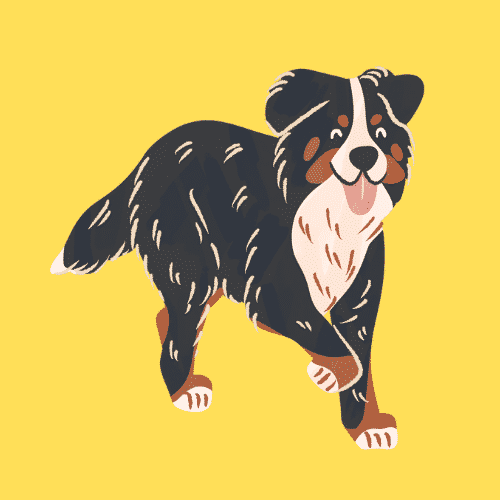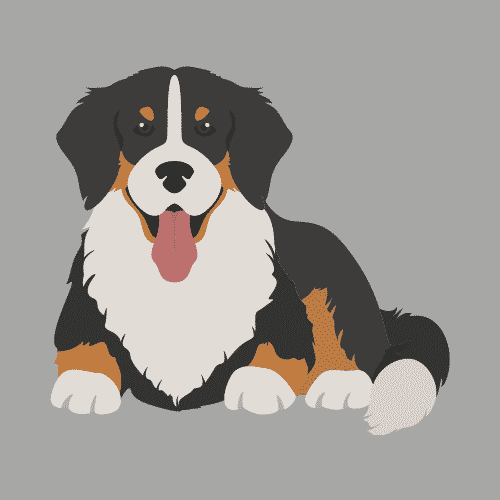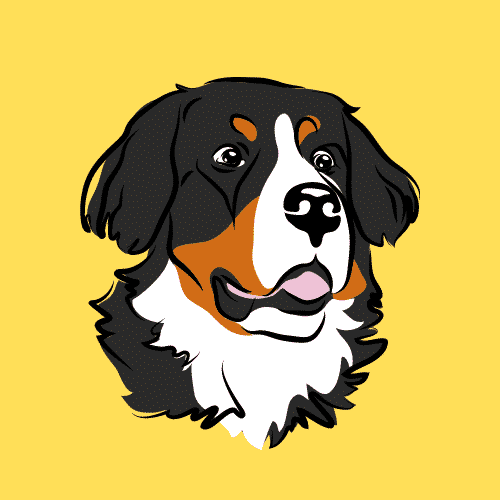If you are looking to adopt a furry friend and the Bernese Mountain breed comes to mind, you may find yourself asking: “Are Bernese dogs hypoallergenic?”

The answer to this question is no – unfortunately, Bernese dogs are not hypoallergenic. Since their fur is thick, it can catch on dust, dead skin, dander, and other debris. These particles can then trigger an allergic person’s allergies.
Are you curious to understand why this happens? Or are you interested in finding an alternative breed of dog that looks and feels just as good? Do you want advice about how to manage a similar dog with your allergies? If so, then read on.
Why Are They Not Considered to Be Hypoallergenic?
Bernese dogs have double-coat fur, which gives them their distinct two-tone look. They are ideal for the outdoors. You can play with them in snow, dirt, parks, the rain – take them camping, take them just about anywhere, and they’ll be able to keep up.
Because of this endurance level, their fur is thick and can endure all kinds of debris. Particles of dust, pollen, and most importantly, organic dander are likely to become trapped in their fur. This debris can then trigger allergies.
With such allergies, reactions can range from mild to extreme. Symptoms can include watery eyes, dry throat, rashes, bumps on the skin, and even constriction in breathing. People with severe allergies should avoid exposure to Bernese dogs as much as possible.
Do They Shed a Lot?
Bernese dogs shed heavily during summers and winters. Throughout the rest of the year, their shedding is moderate and can be easily controlled with regular brushing and grooming.

While their fur is thick and durable with minimum effort, regular grooming can keep it neat, shiny, and tangle-free. A de-shedding brush can also help minimize the amount of fur. Some pet-owners agree that the Bernese sheds significantly less than most other dogs with double-coat fur, but others lament the heavy shedding of its thick, luscious locks. So, experiences can vary, but the Bernese is generally known to be a seasonal shedder.
Alternatives to Bernese Mountain Dogs:
The Bernese is a beautiful, outdoorsy, energetic dog that loves to socialize. Its two-tone fur is soft and friendly and makes it stand out. Since it was originally bred to help with farm labor in the Swiss Alps, it can withstand cold weather and carry out helpful tasks. Keeping this in mind, here are some great alternatives:
- Great Swiss Mountain Dog – robust, outdoorsy, looks similar to the Bernese
- St. Bernard – almost identical to the BMD in every way except it is much bigger (weighs between 120-180 pounds whereas BMD weighs around 70-115 pounds)
- Entlebucher Mountain Dog – considered a smaller version of the Bernese Mountain Dog, weighs around 50 pounds, excellent for families with children.
Advice for People With Allergies:
You should avoid opting for a Bernese Mountain Dog if you have severe allergies. In fact, in such a situation, you should not stay near one for too long either.
It is also important to know whether you are allergic to fur/dander or dog saliva/urine. In the latter case, getting a pup may not be in the cards for you. But if your allergies are mild, there are several ways in which you can handle both your furry friend and your health.
For one thing, groom your pup regularly. While the BMD does not require regular brushing because of your allergies, yours will.
Brushing will help remove loose hair and dander from its coat, minimizing the risk of the allergies that trigger.
However, avoid prolonged contact with the brush and clean it regularly. Additionally, bathe your BMD every 7-10 days. This will help keep it clean and free of allergens.
- Can Dogs Have Tapioca Pearls?
- Is Ginger Ale Good for Dogs?
- How to Train Your Dog to Ignore Other Dogs? [Complete Guide]
FAQS:
Is a Mini Bernedoodle Hypoallergenic?
Yes AND no – while it sheds significantly less fur than other double-coated dogs, you may still be allergic to its saliva, urine, or dander. Spend time around one before making a lifelong commitment.
Why Are Bernese So Expensive?
Bernese are active dogs, so they eat a lot, which means you spend more on their food. You may also spend high amounts of money on their grooming. Sadly, Bernese dogs have the highest reported instances of cancer. They also often require musculoskeletal support, which means you may spend a lot on their health.

What Is the Best Non-shedding Dog for a Family?
Some of the friendliest non-shedding dogs include:
Bichon Frise – The top pick of the American Kennel Club for allergy sufferers.
Shih Tzu – They are small, adorable, low shedding but require regular grooming.
Maltese – These are tiny but great for cuddles since they do not shed.
Poodle – They come in small and big sizes, are super smart and are one of the most popular breeds in the US.
Yorkshire Terriers – These are small but feisty; their gorgeous fur requires regular grooming.
Italian Greyhound – These low-maintenance pups are graceful without much effort – a simple rub with a wet towel suffices for their grooming.
Afghan Hound – They have long, regal hair that doesn’t shed but requires thorough brushing, grooming, and shampooing.
Which Hypoallergenic Dog Is Best for Me?
Which breed you choose is ultimately entirely up to your preferences. If you want a hypoallergenic friend on the bigger side, you may want a Portuguese Water Dog, Italian Greyhound, or Airedale Terrier.
Many small dogs are also hypoallergenic, such as Terriers, Shih Tzus, and Maltese. In the end, which breed you opt for is your choice and responsibility. It is important to do your research and spend an adequate amount of time with the breed you like before making a purchase or adoption.
Final Words:
Allergies can ruin some of the greatest pet friendships, which is why it is important to know what kind you have. If you are allergic to the bodily fluids of dogs, like saliva or urine, you may be better suited to a non-canine friend. But if your allergies are limited to that fur and dander, a hypoallergenic breed would suit you very well.
Whether you choose from the options mentioned above, or if you do your research and pick an entirely new breed, make sure you take good care of the health and hygiene of your furry friend. After all, you are their primary caretaker, and once you choose them, their loyalty is yours forever.

Doctor of Veterinary Medicine (D.V.M.) at Nation Taiwan University,Master of Science (M.S.) in Biomedical Engineering at National Taiwan University of Science and Technology




